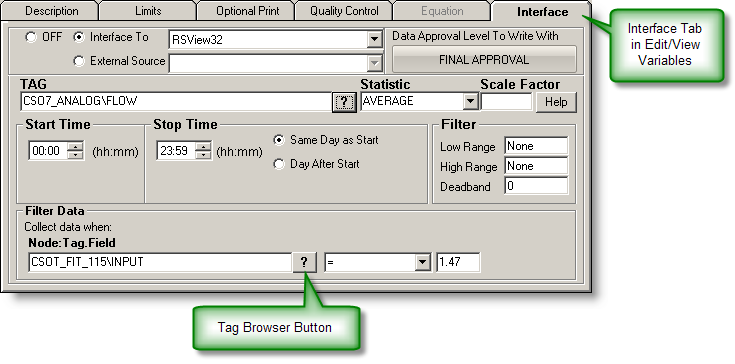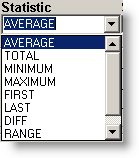Supported variable configurations for the Hach WIMS Direct Server-Side Interface to Telvent SCADA.
To configure a variable to hold values from Telvent's SCADA, select Edit/View Variables in the client and select the Interface tab.
Then click Interface To radio button. The drop down box next to the option is now enabled, click the drop down arrow and choose the Telvent SCADA interface name (name given when configuring the interface).

Now you are ready to configure a signal tag for the RSView32 system. The Tag name and a Statistic are all that are mandatory.
 This is the tag name inthe WonderWare InTouch historian system. The historian referres to it as the Tagname.
This is the tag name inthe WonderWare InTouch historian system. The historian referres to it as the Tagname.
- NOTE: As of version 1.0.1 of this interface, you can specify a particular table to pull data from by placing the table name in front of the tagName separated by a colon (:).
Known valid table names include: Results, Hour, Day, Month, Year.
If you do not specify a tablename, the interface defaults to the Hour table, which was used in version 1.0.0 of this interface.
 This is a listing of all the statistics supported by this interface. This includes the following statistics for a specified time period:
This is a listing of all the statistics supported by this interface. This includes the following statistics for a specified time period:
|
AVERAGE |
Take the average of the data points |
|
TOTAL |
Take the sum total of all values |
|
MINIMUM |
Get the minimum value |
|
MAXIMUM |
Get the maximum value |
|
FIRST |
Get the first value |
|
LAST |
Get the last value |
|
DIFF |
Calculate the difference between the first and last values. If the first value is larger than the second then it will perform the following calculation: (10 ^ (Ceil(LOG(first_value) / LOG(10)))) - first_value + last_value
Ceil will cause the value to round up |
|
RANGE |
Calculate the absolute value of the difference between the minimum and maximum values |
|
INVENTORY |
Running total of used volume. Only decreases in value are counted. Use the DEADBAND option in Hach WIMS variable setup to eliminate erroneous readings due to noise or vibrations. |
 This is the value to multiply the result by when using parameter variable types. Commonly used to convert from one unit base to another. For example to convert gallons per minute (GPM) to gallons per day (GPD), set the scale factor to 1440 (1440 minutes per day).
This is the value to multiply the result by when using parameter variable types. Commonly used to convert from one unit base to another. For example to convert gallons per minute (GPM) to gallons per day (GPD), set the scale factor to 1440 (1440 minutes per day).
 All three fields must have numeric values or the word None (as shown). The Low Range and High Range will crop data from the source. For example to eliminate negative numbers from a particular tag, set the Low Range to 0 (zero) - this will get any values equal to or greater than 0 (zero). The Deadband is used for the statistic Inventory and will elliminate noise levels up to the value specified. For example, if you enter .5 next to Deadband, any value change of .5 or less, will be ignored.
All three fields must have numeric values or the word None (as shown). The Low Range and High Range will crop data from the source. For example to eliminate negative numbers from a particular tag, set the Low Range to 0 (zero) - this will get any values equal to or greater than 0 (zero). The Deadband is used for the statistic Inventory and will elliminate noise levels up to the value specified. For example, if you enter .5 next to Deadband, any value change of .5 or less, will be ignored.

- Start Time will set the beginning of the time slot for this variable.
- Stop Time will set the ending time for the time slot.
- Same Day as Start is only used by daily variables and it means the stop time is on the same day as the start time.
- Day After Start is also only used by daily variables and it means the stop time is a day after the start time.
 Allows you to filter data based on another tag. For example, flow rate while not in backwash, but during backwash we don't want flow rates uploaded to Hach WIMS.
Allows you to filter data based on another tag. For example, flow rate while not in backwash, but during backwash we don't want flow rates uploaded to Hach WIMS.
- Node:Tag.Field is the node, tag, and field associated with what you want to filter by, in our example it would be the backwash state.
- Middle field is the filter operator. This can be <, >, =, <=, >=, <>, or CYCLESTO.
- Last fiedl is the filter value. So when the 'backwash state' is greater than 0 (not backwashing) then our system will get values. When the value drops to zero or negative, do not get values.